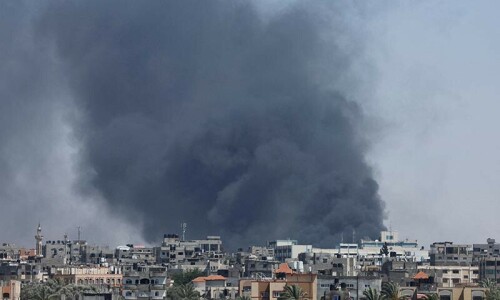
BAGHDAD: With renovated hotels and tighter security, Baghdad is putting on its best face for this week's Arab summit in what Iraq has billed as its re-emergence as a regional leader after decades of unrest.
But while thousands of soldiers and policemen have been drafted in and as much as $500 million spent to upgrade facilities and host the summit, insurgents have still been able to mount devastating attacks and little of the capital's basic services or infrastructure have been improved.
Key to Iraq's plans for hosting the summit are security preparations that include more than 100,000 security forces members deployed in Baghdad, locking down key roads, closing bridges, and using helicopters to provide over watch.
“There are more foot soldiers on the ground, there are more patrols,” Deputy National Security Adviser Safa Hussein told AFP in an interview.
“There will be sky cover, air cover, during the summit.” Hussein said Iraqi authorities had received intelligence reports of al-Qaeda's front group, the Islamic State of Ira, seeking to carry out attacks, but added: “We think that the security will go well.”
He said the most likely form of attack during the summit was “indirect fire”, referring to mortars or rockets.
Security forces have mooted plans to essentially shut down Baghdad on March 29, when Arab leaders are to arrive for the first such meeting to be held in the Iraqi capital since Saddam Hussein's 1990 invasion of Kuwait.
Already, several major roads have been closed for days, worsening Baghdad's already choking traffic, and checkpoint searches have been dramatically toughened, with security officers checking vehicle licence plates against lists of suspected attackers.
The government has meanwhile declared a week of holidays from March 25 until the end of the summit, in the hopes of keeping masses of people at home.
Despite the tightened measures, however, Islamic State of Iraq was still able to carry out a wave of attacks last Tuesday in which 50 people were killed and 255 wounded.
Among the acts of violence was a car bombing in a parking lot directly opposite the foreign ministry in central Baghdad that left three people dead.
Authorities have also sought to spruce up parts of the capital, particularly six hotels where delegates, journalists and officials will be staying, as well as renovating the Republican Palace where the main summit talks are due to be held.
Some routes have also been repaved, including the famed airport road that was dubbed “RPG alley” by US soldiers for its high level of attacks, and 22 villas have been built to accommodate Arab leaders.
State broadcaster Iraqiya has highlighted the improvements, broadcasting long interviews with officials detailing the work on the Republican Palace, one of Saddam's many, and home to the US Coalition Provisional Authority which ruled Iraq from 2003 to 2004.
Official estimates for the total costs of the overall refurbishment have ranged between $400 million and $500 million.
“Organising and hosting such a big event with Iraqi infrastructure, which was completely destroyed, was not easy,” Deputy Foreign Minister Labid Abbawi told AFP.
But despite the summit having been delayed by a year, largely due to turmoil in the region as a result of the Arab Spring uprisings as well as concerns over security in Baghdad, some of the hotel renovations have yet to be completed.
And the upgrades have done little to improve the capital's sporadic electricity supply, poor clean water provision and creaky sewage network, leaving many Baghdad residents frustrated.
Officials, however, argue that the summit will bring with it recognition that Iraq is increasingly stable, with dramatically less violence than during the country's brutal sectarian war of previous years.
“It is a recognition of the Arab countries that Iraq is now back to normality,” Abbawi said. “Iraq is now recognised as a stable country, a peaceful country.”
It remains unclear how many Arab leaders will actually attend the summit, but Abbawi said Iraq expects at least 12 regional heads of state or government to come.
“This is recognition that Iraq, as a country, is in a position to take up this responsibility” of being a leader in the Arab world, he added.












































Dear visitor, the comments section is undergoing an overhaul and will return soon.